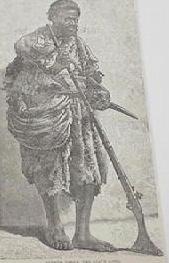- Al-Zubayr Rahman Mansur
-
al-Zubayr Rahma Mansur Pascha, auch Zubehr Pascha, Zobeir Pascha oder Siber-Rachama-Gjimme-Abi (arabisch الزبير رحمة منصور, DMG az-Zubair Raḥma Manṣūr; * 1830; † 1913) war ein sudanesischer Sklavenhändler und militärischer Führer.
Leben
al-Zubayr war ein mächtiger Elfenbein- und Sklavenhändler im Gebiet des heutigen Sudans, Tschad und Zentralafrikas. Er verfügte über eine mehrere Tausend Mann starke Armee. Ab 1869 beherrschte er Bahr al-Ghazal. 1873 bekämpfte er erfolgreich die ägyptische Streitmacht, die unter Ballal Bey nach Bahr al-Ghazal geschickt wurde. Der Khedive von Ägypten gestand daraufhin seine Niederlage ein und machte die Region zu einer offiziellen ägyptischen Provinz, mit al-Zubayr als Gouverneur. 1873 griff aal-Zubayr die Fur-Sultane, damals noch ein unabhängiges Reich im westlichen Sudan, an und eroberte bis 1874 deren Land für die Ägypter. Khedive Ismail Pascha ernannte ihn dafür zum Pascha.
1877 diente al-Zubayr in einem ägyptischen Kontingent im Russisch-Osmanischen Krieg in Rumelien. Im selben Jahr wurde Charles George Gordon (Gordon Pascha) Generalgouverneur Sudans. Am 4. August 1877 wurde eine Vereinbarung zwischen Ägypten und dem Vereinigten Königreich abgeschlossen, die den Sklavenhandel schrittweise unterbinden sollte. Im Juni 1878 initiierte al-Zubayr einen Aufstand der Sklavenhändler. Sein Sohn Suleiman führte den Aufstand an, da al-Zubayr in Kairo festgehalten wurde. Gordon und der aus Italien stammende Gouverneur von Bahr-el-Gazal, Gessi, konnten den Aufstand niederschlagen. Suleiman wurde im Juli 1880 standrechtlich erschossen.
Obwohl Gordon ursprünglich die Deportation Al-Zubayrs nach Zypern forderte bat er die ägyptische Regierung, nach Ausbruch des Mahdi-Aufstandes, Al-Zubayr ihn begleiten zu lassen. Am 26. Januar 1884 trafen deshalb Gordon und al-Zubayr, in Gegenwart von Evelyn Wood, Giegler Pascha und Evelyn Baring, zusammen. Am 8. März telegraphierte Gordon aus Khartum: "Wenn Sie Zubehr nicht senden, gibt es keine Aussicht, die Garnison wegzubringen." [1] Die Einsetzung al-Zubayr wurde aber von der ägyptischen Regierung abgelehnt, die keinen ehemaligen Sklavenhändler an der Spitze des Sudan sehen wollte. 1885 wurde al-Zubayr wegen vermuteter Unterstützung der Mahdisten in Kairo verhaftet und nach Gibraltar gebracht. 1887 wurde ihm erlaubt nach Kairo zurückzukehren. 1899 kehrte er nach der Niederschlagung des Mahdi-Aufstandes in den Sudan zurück.
Im Film Khartoum spielte Zia Mohyeddin die Figur des al-Zubayr.
Literatur
- Byron Farwell: The Encyclopedia of Nineteenth-Century Land Warfare. New York 2001.
- A. Hodges: Kitchener. Vorhut-Verlag, Berlin 1937
- Wilfried Westphal: Sturm über dem Nil: Der Mahdi-Aufstand, aus den Anfängen des islamischen Fundamentalismus. Sigmaringen 1998, ISBN 3-89340-025-7
- Richard Leslie: A Biographical Dictionary of the Sudan. Routledge, 1967, S. 390f. ISBN 0714610372 (Buchsuche)
- Winston S. Churchill: Kreuzzug gegen das Reich des Mahdi (original: The River War. A Historical Account of the Reconquest of the Soudan, London 1899), Frankfurt 2008, ISBN 9783821862040
Einzelnachweise
- ↑ Winston S. Churchill: Kreuzzug gegen das Reich des Mahdi S. 96
Personendaten NAME Rahma, az-Zubair ALTERNATIVNAMEN al-Zubayr Rahma Mansur (Geburtsname); al-Zobeir Rahma Pasha; Zobeir Pascha; Siber-Rachama-Gjimme-Abi KURZBESCHREIBUNG sudanesischer Sklavenhändler und militärischer Führer in Sudan GEBURTSDATUM 1830 STERBEDATUM 1913
Wikimedia Foundation.

